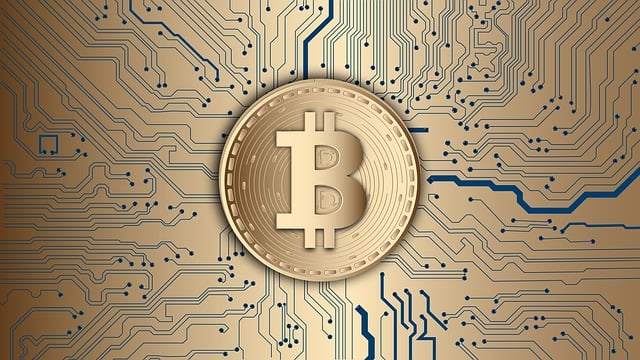Decentralized Finance (DeFi) is a blockchain-based paradigm shift that eliminates traditional banking intermediaries, giving users control over their funds and fostering global financial inclusion. By leveraging smart contracts and peer-to-peer networks, DeFi promises to revolutionize lending, borrowing, trading, and investing, enhancing transparency and accessibility. While defaults in this system present challenges, robust risk management can mitigate systemic risks, enabling DeFi to disrupt conventional banking models and significantly impact the global financial landscape.
Discover the transformative power of Decentralized Finance (DeFi), a revolutionary force reshaping global financial systems. This article explores the fundamentals of DeFi, its rapid growth, and the profound implications for traditional banking. From unlocking access to new financial opportunities to challenging existing structures, DeFi’s potential impact is immense. Dive into our comprehensive guide to understand how this innovative ecosystem navigates challenges and ushers in a new era of inclusive, transparent, and decentralized financial services.
- Understanding Decentralized Finance (DeFi): Unlocking the Basics
- The Current State of DeFi and Its Rapid Growth
- Exploring the Potential Impact on Global Financial Systems
- Navigating Challenges and Embracing a New Era of Financial Services
Understanding Decentralized Finance (DeFi): Unlocking the Basics

Decentralized Finance (DeFi) represents a revolutionary concept in the financial realm, aiming to democratize access to traditional financial services and products by leveraging blockchain technology. Unlike centralized banking systems, DeFi operates on a peer-to-peer network, eliminating intermediaries like banks. This innovative approach allows users to have greater control over their funds while enjoying enhanced transparency and security through cryptographic techniques.
The potential impact of DeFi is profound, promising to reshape the way financial transactions are conducted. By removing geographical barriers and offering lower transaction costs, DeFi has the capacity to include unbanked or underbanked populations in the global financial system. Moreover, DeFi applications can provide a wide range of services, from lending and borrowing to trading and savings, all accessible through smart contracts on decentralized networks. This innovative financial ecosystem holds great promise for driving economic growth and fostering financial inclusion worldwide.
The Current State of DeFi and Its Rapid Growth

The current state of decentralized finance (DeFi) is marked by an unprecedented surge in adoption and investment, showcasing its immense potential impact on the traditional financial landscape. This innovative sector leverages blockchain technology to create a more open and accessible financial system, free from centralized control. DeFi platforms offer a diverse range of services, including lending, borrowing, trading, and yield farming, all operating transparently on smart contracts. The past few years have witnessed a phenomenal growth spurt, with the total value locked (TVL) in DeFi reaching staggering amounts, indicating a growing trust and participation from users worldwide.
This rapid growth can be attributed to several factors. Firstly, the desire for financial independence and control among individuals has been catalyzed by the promise of DeFi to democratize access to financial services. Secondly, the ongoing digital transformation across industries has accelerated the adoption of blockchain technology, making DeFi more accessible and user-friendly. As DeFi continues to evolve, it holds the potential to reshape not just the banking sector but also areas like insurance, payments, and even capital markets, offering alternatives that could disrupt established models and create a more inclusive and efficient financial ecosystem.
Exploring the Potential Impact on Global Financial Systems

The concept of default, particularly in the context of decentralized finance (DeFi), opens up intriguing possibilities for global financial systems. DeFi’s inherent transparency and lack of intermediaries could significantly alter traditional lending and borrowing dynamics. If a default occurs in this decentralized environment, it might not follow the same trajectory as conventional banking defaults, leading to unique challenges and opportunities.
For instance, smart contracts, which are the backbone of DeFi, automatically enforce repayment terms. A default could trigger automated actions, such as seizing collateral or redistributing funds among affected parties, potentially minimizing the overall impact. However, this also raises concerns about systemic risk and the need for robust risk management strategies in DeFi platforms to ensure stability, even during exceptional events.
Navigating Challenges and Embracing a New Era of Financial Services

Navigating the challenges of traditional financial systems has paved the way for a new era in decentralized finance (DeFi). DeFi offers a promising alternative, aiming to revolutionize the industry by removing intermediaries and giving control back to users. The potential impact is significant; it can democratize access to financial services, enhance transparency, and create more inclusive economic opportunities.
By leveraging blockchain technology, DeFi platforms enable peer-to-peer interactions, allowing individuals to borrow, lend, trade, and invest without relying on banks or other centralized entities. This shift has the capacity to disrupt established financial models and foster a more robust and efficient market. The future of finance looks set to be decentralized, offering a fresh perspective on how we interact with and manage our money.
Decentralized Finance (DeFi) has emerged as a disruptive force, reshaping global financial systems with its remarkable growth and untapped potential. By harnessing blockchain technology, DeFi offers inclusive, transparent, and efficient financial services to users worldwide. While challenges remain, the current trajectory suggests that DeFi could significantly alter traditional banking models, empowering individuals and fostering economic growth. As this innovative sector evolves, understanding and embracing its potential impact is crucial for navigating the future of finance.
